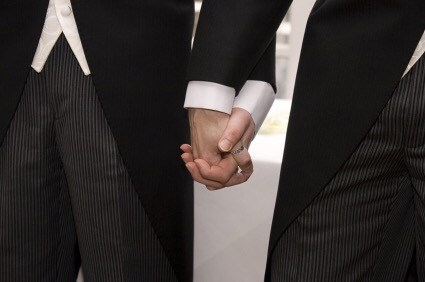Supreme Court agrees to take up same-sex marriage
Fri. January 16, 2015 3:01 PM by GoPride.com News Staff
Washington, DC -
The Supreme Court agreed Friday to decide whether the U.S. Constitution guarantees all Americans the right to enter into same-sex marriages.
"The Supreme Court's decision in these cases could finally bring the country to a national resolution on marriage," said Freedom to Marry founder and president Evan Wolfson. "When the nine Justices deliberate, they must know that America is ready for the freedom to marry, and that no family and no state should be left out."
The Court had before it petitions from four states -- Ohio, Tennessee, Kentucky and Michigan - all in the U.S. Sixth Circuit Court of Appeals which recently went against the national trend and upheld gay marriage bans. The court granted petitions for all four states.
The court had refused to hear several gay marriage cases in October; however, this time is different because lower federal courts are now divided on the constitutionality of same-sex marriage bans.
The nine justices are expected to hear oral arguments in April and deliver a ruling by June.
Bernard Cherkasov, CEO of Equality Illinois, issued the following statement: "Friday's order by the Supreme Court to hear four marriage equality cases is a decision whose time has come. With 70 percent of the U.S. population now able to marry in 36 states and the District of Columbia, the question of the freedom to marry is ready for a single national standard.
"Same-sex couples already enjoy the rights and recognition of marriage here in Illinois, but a national recognition of the gay and lesbian couples' constitutional rights would set the stage for greater national understanding that we all want the same chance to live our lives and build strong families.
"It is also important to Illinoisans that the court is considering the issue in two parts, whether a state is required to issue a license to a same-sex couple, and whether a state is required to recognize a lawful marriage of a same-sex couple performed in another jurisdiction. How could it be that an Illinois family traveling no further than Michigan or Kentucky loses its rights when it crosses state lines? This must be corrected by the Supreme Court."
"The Supreme Court's decision in these cases could finally bring the country to a national resolution on marriage," said Freedom to Marry founder and president Evan Wolfson. "When the nine Justices deliberate, they must know that America is ready for the freedom to marry, and that no family and no state should be left out."
The Court had before it petitions from four states -- Ohio, Tennessee, Kentucky and Michigan - all in the U.S. Sixth Circuit Court of Appeals which recently went against the national trend and upheld gay marriage bans. The court granted petitions for all four states.
The court had refused to hear several gay marriage cases in October; however, this time is different because lower federal courts are now divided on the constitutionality of same-sex marriage bans.
The nine justices are expected to hear oral arguments in April and deliver a ruling by June.
Bernard Cherkasov, CEO of Equality Illinois, issued the following statement: "Friday's order by the Supreme Court to hear four marriage equality cases is a decision whose time has come. With 70 percent of the U.S. population now able to marry in 36 states and the District of Columbia, the question of the freedom to marry is ready for a single national standard.
"Same-sex couples already enjoy the rights and recognition of marriage here in Illinois, but a national recognition of the gay and lesbian couples' constitutional rights would set the stage for greater national understanding that we all want the same chance to live our lives and build strong families.
"It is also important to Illinoisans that the court is considering the issue in two parts, whether a state is required to issue a license to a same-sex couple, and whether a state is required to recognize a lawful marriage of a same-sex couple performed in another jurisdiction. How could it be that an Illinois family traveling no further than Michigan or Kentucky loses its rights when it crosses state lines? This must be corrected by the Supreme Court."






